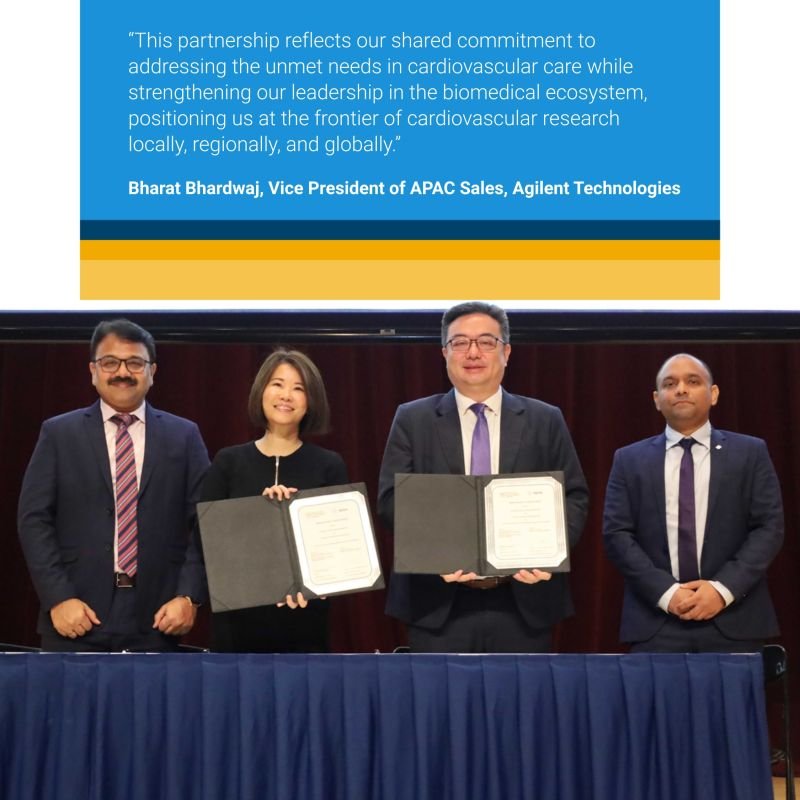Agilent and NHCS Forge Five Year Partnership To Advance Metabolic Heart Failure Research
14 November 2025 | Friday | News

Agilent Technologies Inc. (NYSE: A) announced the signing of a five-year Memorandum of Understanding (MOU) with National Heart Centre Singapore (NHCS) to accelerate innovation in metabolic heart failure research, one of the most complex and underserved areas in cardiovascular medicine.
Heart failure remains a leading global cause of death and disability, with metabolic forms such as diabetic heart failure and heart failure with preserved ejection fraction (HFpEF) posing challenges due to limited treatment options. Under this agreement, Agilent and NHCS will combine their expertise in human cardiac organoids using human-derived heart tissues with cutting-edge analytical technologies, including Agilent’s latest Seahorse XF Flex Analyzer which expands real-time metabolic analysis into 3D tissues and organoid workflows to investigate metabolic drivers of heart failure.
“Our collaboration with Agilent allows us to advance the study of heart disease using patient-specific beating heart cells. By combining NHCS’s expertise with Agilent's advanced technology, we can detect the earliest changes in how heart cells use energy before visible damage occurs. This accelerates the discovery of new therapies and safely testing them, ultimately offering hope to heart failure patients who currently have limited treatment options,” said Prof Derek Hausenloy, director of the National Heart Research Institute Singapore (NHRIS) at NHCS.
NHCS has established itself as a leader in modelling monogenic cardiac diseases using patient-specific induced pluripotent stem cells (iPSCs), which led to novel therapeutic targets now undergoing clinical evaluation³,⁴. Building on this foundation, the integration of Agilent’s next-generation technology and NHCS’s Preclinical Platform for Development of Therapeutics for Heart Failure (PREVENT-HF) positions the collaboration to provide hypotheses for clinical validation, offering new insights into disease progression, novel therapeutic development, and assessment of treatment safety and efficacy in clinically relevant models.
“Together with NHCS, we are bridging science and technology to reimagine how metabolic heart failure is understood and treated through translational research. This partnership reflects our shared commitment to addressing the unmet needs in cardiovascular care while strengthening our leadership in the biomedical ecosystem, positioning us at the frontier of cardiovascular research locally, regionally, and globally.” Said Bharat Bhardwaj, vice president of APAC sales at Agilent.
Over the past decade, Agilent has made significant contributions to research advancement aimed at improving population health in Singapore. In 2019, the National University of Singapore (NUS), National University Hospital (NUH), and Agilent launched a $38 million research hub to boost clinical diagnostics and biochemistry testing.
Last year, Agilent partnered with NUS, acting through the Yong Loo Lin School of Medicine (NUS Medicine), established the NUS-Agilent Center of Excellence in Cell Metabolism in support of the Singapore Ministry of Health’s Project RESET, Cardiovascular Metabolic Disease Translational Research Programme (CVMD-TRP) and PREVENT-HF to accelerate the discovery of novel insights into the complex mechanisms of heart disease.
Most Read
- How Does GLP-1 Work?
- Innovations In Magnetic Resonance Imaging Introduced By United Imaging
- Management of Relapsed/Refractory Multiple Myeloma
- 2025 Drug Approvals, Decoded: What Every Biopharma Leader Needs to Know
- BioPharma Manufacturing Resilience: Lessons From Capacity Expansion and Supply Chain Resets from 2025
- APAC Biopharma Review 2025: Innovation, Investment, and Influence on the Global Stage
- Top 25 Biotech Innovations Redefining Health And Planet In 2025
- The New AI Gold Rush: Western Pharma’s Billion-Dollar Bet on Chinese Biotech
- Single-Use Systems Are Rewiring Biopharma Manufacturing
- The State of Biotech and Life Science Jobs in Asia Pacific – 2025
- Asia-Pacific Leads the Charge: Latest Global BioSupplier Technologies of 2025
- Invisible Threats, Visible Risks: How the Nitrosamine Crisis Reshaped Asia’s Pharmaceutical Quality Landscape
Bio Jobs
- Sanofi Turns The Page As Belén Garijo Steps In And Paul Hudson Steps Out
- Global Survey Reveals Nearly 40% of Employees Facing Fertility Challenges Consider Leaving Their Jobs
- BioMed X and AbbVie Begin Global Search for Bold Neuroscience Talent To Decode the Biology of Anhedonia
- Thermo Fisher Expands Bengaluru R&D Centre to Advance Antibody Innovation and Strengthen India’s Life Sciences Ecosystem
- Accord Plasma (Intas Group) Acquires Prothya Biosolutions to Expand Global Plasma Capabilities
- ACG Announces $200 Million Investment to Establish First U.S. Capsule Manufacturing Facility in Atlanta
- AstraZeneca Invests $4.5 Billion to Build Advanced Manufacturing Facility in Virginia, Expanding U.S. Medicine Production
News











